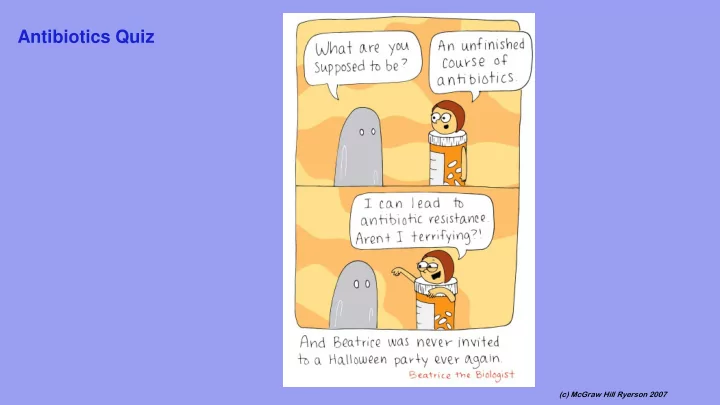

Antibiotics Quiz (c) McGraw Hill Ryerson 2007
Antibiotics- Penicillin • Penicillin was the first antibiotic to be discovered. • It was discovered in 1928 by Alexander Fleming, a Scottish scientist working in St Mary's Hospital London. • Fleming discovered that mould from a Penicillium fungus had antibacterial properties. The antibiotic was named penicillin after the fungus. • Antibiotics can be derived from fungi, other microorganisms or can be synthetically produced (c) McGraw Hill Ryerson 2007
Antibiotics • Used only to fight Bacterial Infections • Can be broad or specific • Work by attacking the cell wall of bacteria Prevent bacteria from synthesizing peptidoglycan Inhibit DNA replication Inhibit protein synthesis • Will not work on Viruses Why? (c) McGraw Hill Ryerson 2007
Antibiotics resistance • Bacteria are continually adapting to develop ways of not being killed by antibiotics. This is called antibiotic resistance. Resistance develops due to mutations in the bacterial DNA. The genes for antibiotic resistance can spread between different bacteria in our bodies through Conjugation Reproduction (c) McGraw Hill Ryerson 2007
• Antibiotic resistant bacteria can be carried by healthy or ill people and can spread to others just as other types of microbes would by shaking hands or touching all types of surfaces on animals, vegetables or food where bacteria are present. • Antibiotic resistance arises in our bodies bacteria, or in animals, due to the overuse and misuse of antibiotics. • The more often a person takes antibiotics, the more likely they are to develop antibiotic resistant bacteria in their body. (c) McGraw Hill Ryerson 2007
Preventing Resistance • To prevent resistance, antibiotics should only be taken as prescribed by a doctor or nurse. • The important points to remember are: 1. antibiotics do not need to be taken for colds and flu or most coughs, sore throats, ear infections or sinusitis as these usually get better on their own 2. it is important to take the antibiotic exactly as instructed and complete the course of antibiotics, to decrease the risk of emergence of resistance 3. antibiotics are personal and prescribed for individuals and for a particular infection. They should not be shared or taken for a different illness (c) McGraw Hill Ryerson 2007
Antibiotic Resistance • Antibiotic Resistance TedX • Resistance Documentary- Netflix (c) McGraw Hill Ryerson 2007
Recommend
More recommend